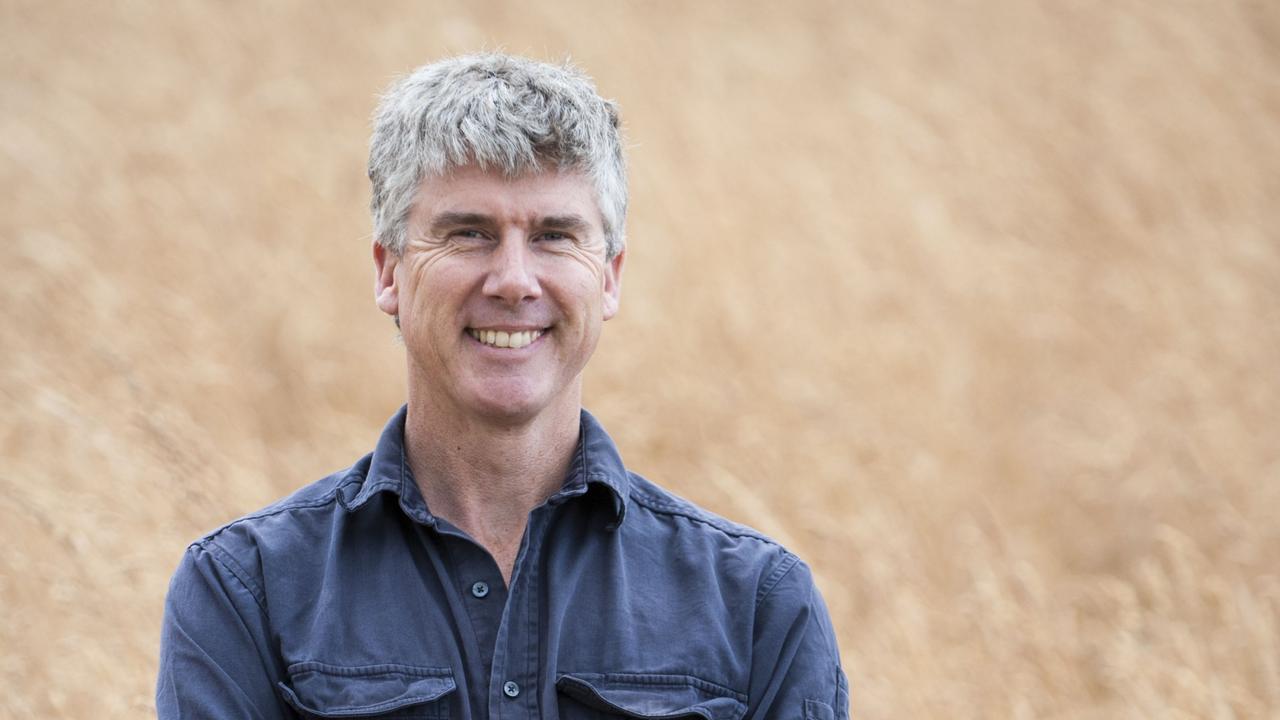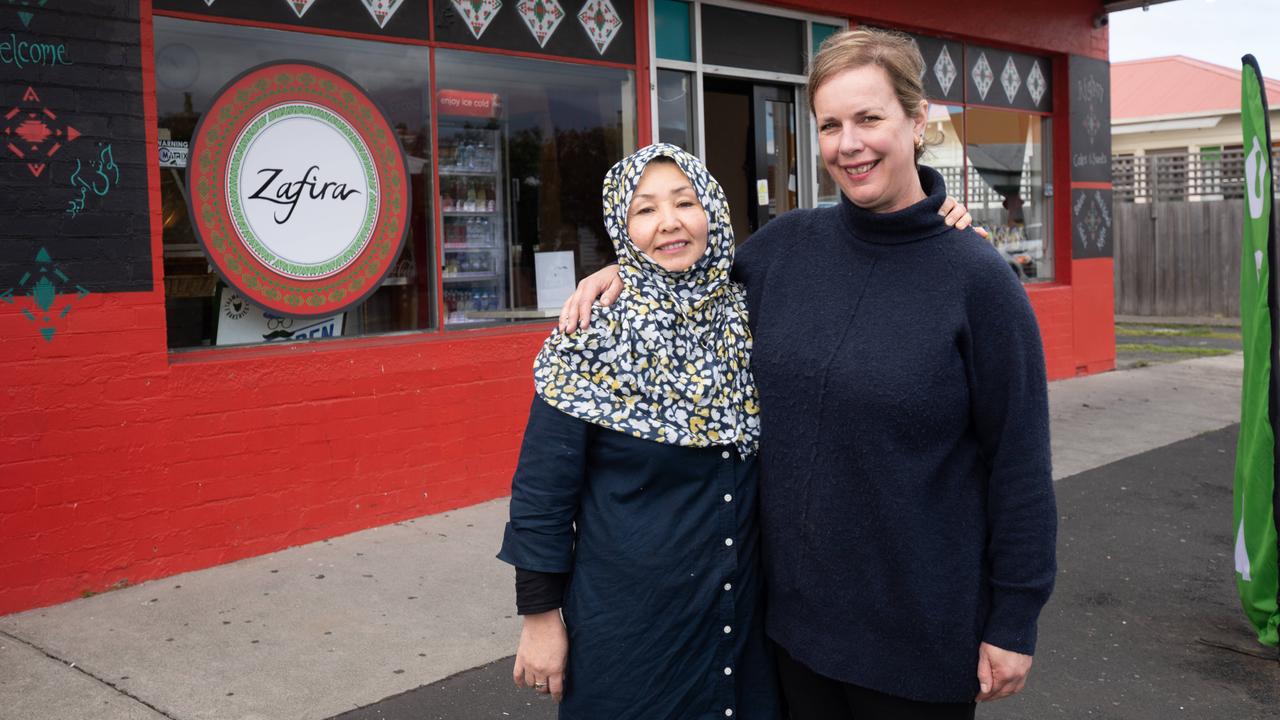TasWeekend: A land of eastern promise
When it comes to high-quality boutique produce, we are an island of difference in a sea of sameness, argues the chair of Brand Tasmania. And one of the most lucrative markets in the world is already onto us.
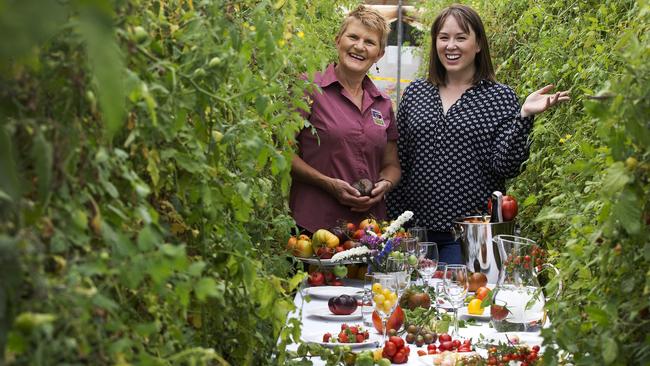
Taste Tasmania
Don't miss out on the headlines from Taste Tasmania. Followed categories will be added to My News.
IT is a special apple that only grows on one orchard in the world. Discovered by chance because of its striking red skin, sixth-generation Huonville farmers from the Griggs family stumbled upon what is now known as the Rubigold apple growing on one branch, on one apple tree in their orchard 20 years ago. They grafted the wood and grew more, sharing them with their family and friends who told them: “Yeah, they’re good, we want more.” This new kind of apple was named to describe its look — deep red on the outside with a golden flesh that resists browning inside. Its name also is in memory of Ruby Pearl Griggs, who helped to run the Tasmanian orchard between the 1940s and 1960s.
“The colour caught our eye,” says Ruby’s grandson Dane Griggs, who now manages the farm with his brother Brett. “It just stood out because the whole limb was 100 per cent red apples. We thought, ‘gee, that’s interesting’. We didn’t think ‘this is my pot of gold — this is going to change the world’. We just thought ‘this is just one of those things’.”
At this time of year, Griggs and his team pack 20 tonnes of Rubigold every week on their farm, which he proudly says has the lowest carbon footprint of any commercial apple orchard on the planet. Over the years, the Rubigold has become their best-selling apple. The variety is so popular that they now sell three bags of Rubigold to one bag of all the other varieties combined. Tasmanians can pull up outside the Griggs’ family orchard on the Huon Highway in Huonville and pick up a 2kg bag of Rubigold apples for just $3. In Hong Kong, a single Rubigold sells for $4.30.
When TasWeekend tells Griggs the news his apples are attracting such strong prices in Hong Kong, he gets the giggles. “$4.30 for just one apple!” the down-to-earth farmer chuckles. “That’s a good little market.” Given that in Chinese culture red symbolises good fortune and joy and yellow means good luck, you couldn’t dream up a better looking apple to stock the shelves of the elite supermarkets of Hong Kong.
Not only are Rubigolds the perfect example of the two most prominent Chinese celebratory colours, they also grow into quite a large apple —– which makes them perfect gifts. Chinese customers also love that these apples come from the clean, green island at the bottom of the world that they are hearing more and more about.
Griggs sends about one tonne of Rubigold apples to Hong Kong each fortnight, but he’s not the only one reaping the benefits of the Asian powerhouse’s love affair with the Apple Isle. This time last year, Hong Kong’s Australian economic and trade office director Raymond Fan told the Mercury the state’s fine produce was in high demand in his city.
“Tasmania is very famous in Hong Kong, everyone knows about it,” Fan says. “Many of your products are high quality, and people in Hong Kong really like the cherries, salmon and other products like your cheeses and honey.”
Since then, this relationship has been growing steadily, thanks in part to work by Tasmanian-born businessman and exporter of Tasmanian products David Meredith and Australian wine expert Tyson Stelzer, who recently hosted five Tasmanian Showcase Tastings in Hong Kong, which included an impressive spread of some of the state’s best produce as well as its finest pinot and sparkling wines.
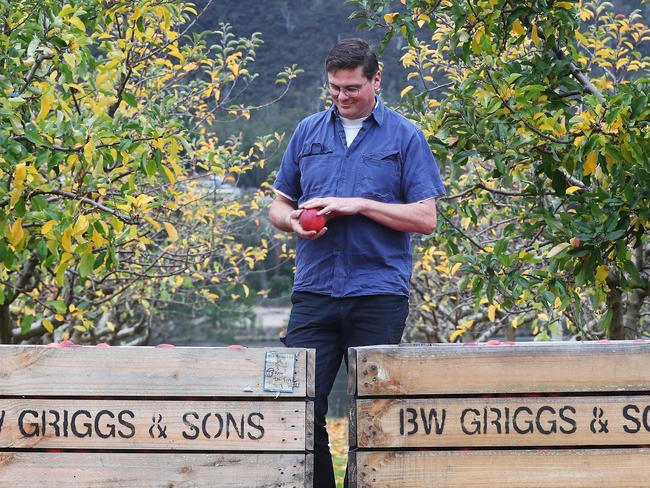
Another person helping strengthen the relationship is Anna Yip, who created Off The Table, a business that allows people to discover where their food comes from through specially designed farm tour experiences. “In Chinese culture, food is the perfect thing to give someone as a gift,” Yip says. Half Chinese, Yip grew up in Sydney and moved to Tasmania three years ago. “The story of where food comes from is very important in Chinese culture,” Yip says. “We design experiences where you can go and see what actually is important when it comes to your food: learn about organic production or hydroponics or grass fed — whatever the method is — and, at the same time, discover stories about origin which are really interesting. That is the whole idea about sixth-generation farming or that this produce is only available in this part of the world or this is a really special type of food.”
Yip is in early discussions about providing exclusive tours for the customers of Meredith, who has been successfully exporting premium Tasmanian produce to Hong Kong for five years. Meredith’s business partner is Chinese-born Calvin Yuen, who translates the Tasmanian story into the Chinese language, and understands how Chinese households use food day-to-day.
The demand for Tasmanian seafood in Hong Kong is particularly huge, says Meredith. “The sea urchin can be really big, we can’t get enough crayfish, abalone is huge — we could sell double the amount but top of the list would be abalone and then oysters and crayfish.” Registered in Australia as Tasmania Fresh and known by the brand name Tas’mania in Hong Kong, Meredith and Yuen’s 100 supermarket clients in the most expensive areas of Hong Kong are also learning about our little paradise island after sampling products such as our smoked salmon and honey and cherries.
“We go into high-end stores similar to the David Jones food hall in Australia and market ‘clean and green’ with a lot of tasting,” Meredith says. “It’s through tasting the product that they understand why it’s so expensive.”
Sometimes, just that initial taste of Tassie is enough for customers to want to fly south and see Tasmania for themselves. And Yuen says these cashed-up Hong Kong clients want to do the kind of food tours that nobody else gets to do. “They want to meet the people who grow the food and hear the stories about how the food is produced — and price isn’t an issue at all,” Yuen says. Meredith adds: “They want to hear the story. It’s all about the stories.”
The Tasmanian premium producers Meredith and Yuen work with usually understand they are on to something special, but often have little understanding of just how much the rest of the world wants it. “Their heart and soul goes into what they do,” Meredith says. “They channel that passion into their food but sometimes they don’t realise just how special it is.”
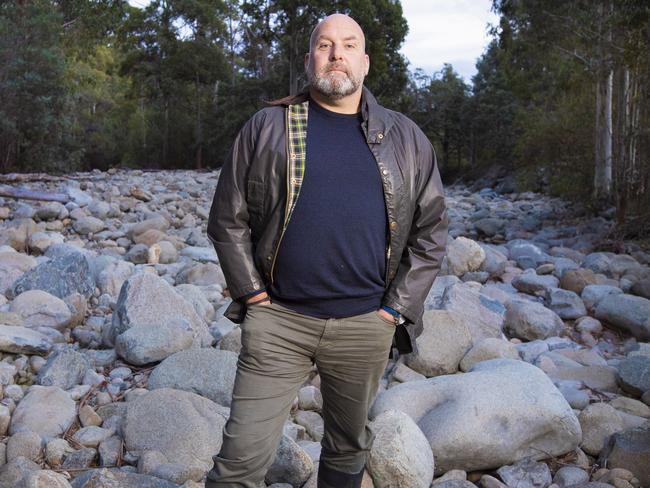
Getting fresh Tasmanian produce off our island and to Hong Kong involves a fairly complicated supply chain that doesn’t make it easy or cheap. Anything can — and often does — happen at any stage of the journey that can not just delay its arrival but potentially spoil the produce altogether. Meredith rattles off some of the challenges — daylight saving miscalculation breaking transport connections and stronger than expected forecast headwinds, or more-than-expected luggage checked into a flight leading to his freight being the item that’s taken off the plane at the last minute.
He gives an example of the logistics: Tasmania Fresh exports Houston’s Farm pre-packaged salad leaves from the Coal River Valley to Hong Kong every week. Orders are placed on a Thursday. The leaves are then picked, cooled and triple-washed, dried and packaged before being packed on Sunday morning. On Monday, they are flown to Melbourne.
A day later, they are sitting on the fresh food shelves in Hong Kong stores. But temperature control is critical. “Once lettuce gets above a certain temperature there is no recovery,” Meredith says. “Once it’s wilted, there’s no coming back.” That means a hot day in Melbourne can throw a serious spanner in the works.
Or how about the cherries? Premium cherries are the most popular fruits that Tasmania Fresh exports to Hong Kong. They are in such strong demand because of their generous size, rich, red colouring and juicy deliciousness, Meredith says. They are so popular that he says businesses in Hong Kong often try to replicate the Derwent Valley Reid family’s golden packaging and flog off inferior cherries as Tasmanian.
But, like lettuce, cherries are delicate. The fruit needs to be treated with the utmost care, or they will likely split or spoil. Getting cherries off the island and to Hong Kong supermarket shelves is therefore a logistical nightmare.
Yuen says he associates cherry season in December and January with “chaos”. Finding trucks at that time of the year is difficult, getting space on aircraft is a fight, and it’s the hottest time of year. It is also the perfect time, as people in China like to give the cherries away as gifts for Chinese New Year in late January (Yuen knows of some Hong Kong clients who have paid up to $200 for 2kg of Tasmanian cherries). But when it’s cherry season, Yuen says, his phone is never switched off.
“It’s constant problem-solving,” he says. “You can get a call that the cherries have been pushed off or bumped to another flight but the last thing you want is for them to be sitting on a tarmac at Tullamarine in 40C heat for four hours.” Yuen tries to book flights late at night and early morning to avoid that risk.
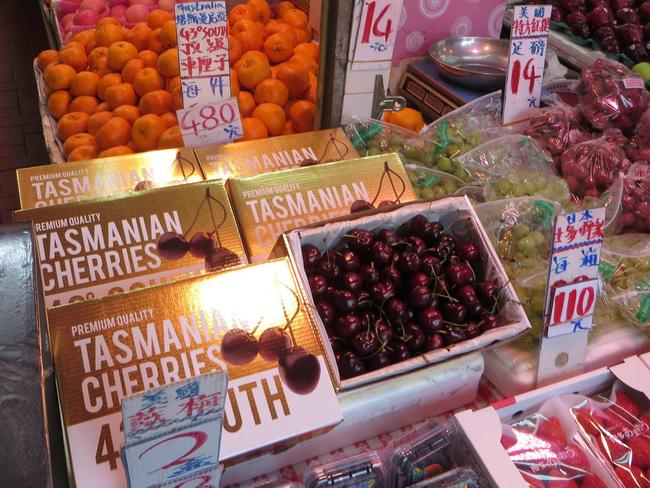
In late March this year, Meredith and Yuen presented some of their client’s produce at a series of special invitation-only events in Hong Kong organised by Tourism Tasmania. The food they selected for their tasting platters was matched to Tasmania’s top estate sparkling wines and pinot noirs.
Huon smoked salmon with Hill Farm Preserve’s horseradish mustard was placed alongside five Bruny Island Cheese Co cheeses. They included the soft 1792 and the hard, natural-rinded Tom as well as the oozy, white-moulded Saint; the prosciutto-wrapped Otto; and the Oen washed in pinot noir and wrapped in vine leaves. Other selected cheeses included Diane Rae’s Grandvewe sheep’s cheese, Ashgrove Farm’s 18-month aged cheddar, and other Tassie favourites such as wasabi and pepperberry cheese. The plates were finished off with fig and quince pastes from Ashgrove Farm alongside Wellington Apiary honeycomb and Tasmanian walnuts.
Meredith and Yuen then explained to those gathered the special stories behind the food. Meredith says the feedback was, generally, “How delicious … and, how interesting”. “They were eager to try it all,” Meredith says. “It was surprising to see how involved they were with these different textures and flavours and to find — against what I would have believed — that the more pungent, soft cheeses were the first to disappear.”
The man who put together the six wine tasting events was author and communicator Tyson Stelzer. He says the room full of Hong Kong’s wine-tasing elite were also blown away with what was being poured into their glasses. “I’ve never seen an international event series received with the amount of enthusiasm that we saw in Hong Kong,” Stelzer says.
“This is a market that is so entrenched in the great wines of the world. They have more interest in prestige champagne and in top wines than virtually any other market, so they are very discerning and they’ve got the money to spend on the great wines of the world. So for any region to come into that, it is not an easy task to achieve, but what we [showcased from Tasmania] was very strongly received.”
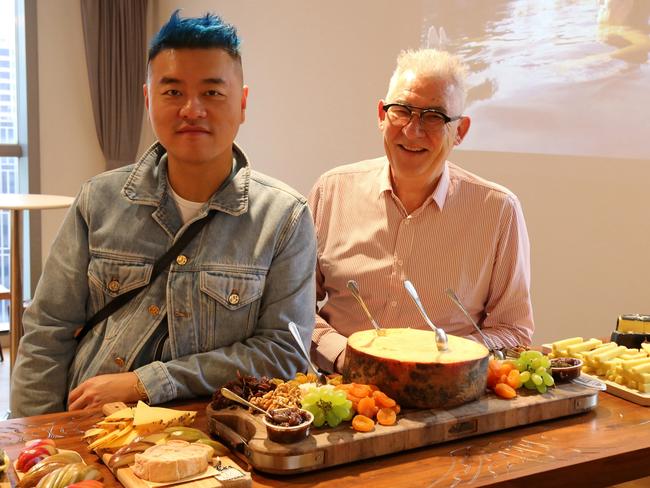
Tasmanian wine industry experts say in terms of quality, everything is pointing to yet another cracking season for the state’s grape growers — with particular praise for sparkling fruit this year. According to industry leaders, this year’s Tasmanian pinot noir harvest has been excellent in both colour and flavour. Hong Kong is one of the international markets Tasmania is focusing on to help boost export sales of some of our finer wines.
According to the latest information, currently Tasmania sells about 1700 dozen bottles of wine to Hong Kong every year — with each one selling there at almost double the price that they are available for in Tasmania. Despite its modest presence in the Hong Kong market, business leaders believe this represents a great opportunity for Tasmanian wine growers to build on this strong interest.
“What it means is opportunity,” says Brand Tasmania’s new chair Nick Haddow, when asked for his opinion on the implications for Tasmania.
Haddow was appointed in March to chair what is Australia’s first statutory place branding authority. He says he’s manifestly aware of the responsibility that comes with the position. “I think if Brand Tasmania works very well it has the potential to make an incredible contribution to the Tasmanian community and economy. And so that weighs heavily on me — you know, making sure that we don’t stuff it up. Making sure that we rise to the challenge and are brave enough to achieve those outcomes that I think are going to be expected of us.
“I think bravery is going to be required for all Tasmanians over the next 20 years in order to reach our potential and to become the Tasmania that we want to become,” Haddow says.
“To be brave enough to think big, to back ourselves, to have the self-confidence and self-conviction to achieve those things. I think that is going to take a level of bravery, and right now we are being handed that opportunity as a society, as an economy — as a place — to really define who it is that we are and who it is that we want to be.”
When we chat by phone, Haddow is in the car on his way to pick up his teenage daughter from horse riding. As we talk, he makes it clear that he’s very aware that he has to — as he describes it — wear two hats. One is as the Brand Tasmania chairman, the other is as the businessman behind Bruny Island Cheese Co. Throughout the interview he constantly makes it clear which of those hats he is wearing — and sometimes, he laughs, “I’m wearing both”.
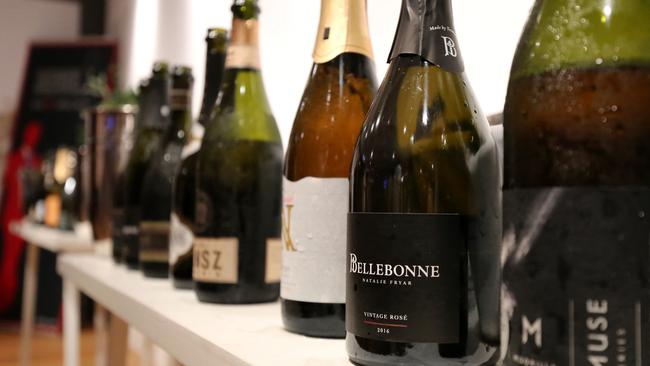
As the Bruny Island Cheese guy, Haddow says he plans to increase his cheese production in the next few years — and consequently he is already looking at ways to get his premium cheeses into Hong Kong supermarkets. He visited Hong Kong late last year, and says he was amazed at the depth of understanding about Tasmania: where it is, what we do, and why it’s special. “That is profoundly different to what it was 10 years ago,” Haddow says.
He’s keen also to take other premium Tasmanian products along for the ride. “The middle class in places like Hong Kong are exposed to benchmark produce from all around the world, and so for them to singularly get excited about a location like Tasmania speaks very, very highly of our inherent quality,” Haddow says. “From a Brand Tasmania point-of-view, being able to capitalise on that awareness — particularly in a market like Hong Kong which is regionally nearby, has a very international demographic but also has access to the kind of people we would like to be attracting more and more to Tasmania as visitors — is absolutely exciting.”
Haddow says he’s not at all surprised that some of his more soft and pungent cheeses were the first to disappear off the Tas’mania platters in Hong Kong. The 1792 cheese is an example. It’s matured on aromatic Huon pine boards, and named after the year the French first set foot on Bruny Island. “Places like Hong Kong import an enormous amount of cheese from France and Italy,” Haddow says. “All very big and strong cheeses, so gone are the days where we can say Asian cultures don’t like or understand cheese because I don’t think that is the case.
“Our cheeses absolutely reflect a place, like where they’ve come from,” Haddow says. “[The high-end Hong Kong market] is not looking for a product that is a facsimile or a replica or copy of another product somewhere else in the world. They are actually looking for something that really speaks of where it comes from and displays some real, authentic, regional character.”
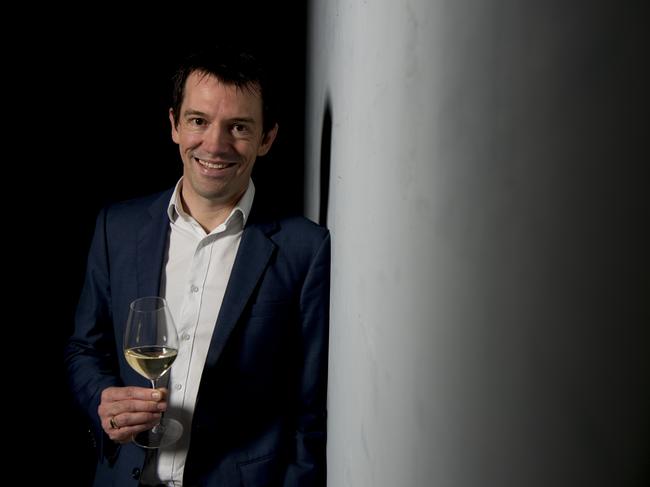
Haddow is skilled at telling a good story. He pauses at the perfect time for effect and thinks deeply before responding to questions. It is clear as he talks he is a fiercely passionate Tasmanian, and proud of his own story. When he tells you about his own cheeses, for example, it’s like Haddow has escorted you to the banks of the Huon River where his 56 rare-breed cows graze. Every one of them — Haddow refers to them as his ‘girls’ — have been individually named by his cheese club members: Meralda, Peaches, Pfeffernusse (“it’s a long name for a very short ear tag that one”) … Freckles. Changing hats, Haddow says Tasmania is the best state in the country when it comes to telling the story behind our produce. “We stand out because of the fact we are an island, and because of the fact we are a singular region. We make ‘Tasmanian produce’. Ours is not a region, within a region, within a region. That is very, very powerful, and I don’t think that we as a community really understand the benefit or opportunity that that presents to us.”
Anna Yip does. She has made sure that the Tasmanian businesses she partners with include a unique QR Code on their packaging. Scanning that code with a mobile phone plays a video of the farm the product came from, and a link to book one of her tours to the very same property.
“It’s a world-first concept,” Yip says. “It’s phenomenal what we are doing. So someone in a Chinese supermarket can select something off the supermarket shelf, scan that same product from Tasmania, and then connect directly with that producer.”
The kinds of experiences these customers are then connected to are all specially designed and incorporate a whole range of tours that can be tailored to the audience. “This is the next step for us to be able to elevate Tasmanian producers and offer a travelling audience the opportunity to really experience Tasmanian produce at the source,” Yip says. “A lot of Tasmanian foods have fantastic stories of origin and providence, and what we can do is connect people with those stories so they can come and actually experience them for themselves.”
Haddow agrees. “We live in an amazing place, and it’s actually just getting better and better all the time. As the rest of the world becomes more and more the same, we are an island of difference in that sea of sameness.
“If it’s coming from Tassie, there is an expectation that it’s going to be good. And there’s a lot of people who have worked very hard to develop that expectation.”
The biggest challenge now, Haddow says, is scalability. How do we grow our capacity to supply markets like Hong Kong without compromising the quality of our production or our brand value? “It’s different for everyone,” he says. “We have got some great operators in Tassie and we also have a State Government that is incredibly supportive of this.
“The world wants what we’ve got, and they respond really well to what we’ve got. To be able to offer that in a way that is still safe, still clean, still accessible — why wouldn’t the world want this?”

